|
Executive Function
In the intricate workings of the human brain, executive functions stand out as the conductors orchestrating our thoughts, actions, and emotions. These cognitive processes, essential for controlling and managing other brain functions and behaviors, are akin to a sophisticated internal management system. Just as a seasoned CEO steers a company through the complexities of business, our brain's executive functions guide us through the maze of daily life, decision-making, and social
interactions. Let’s delve deeper into the pivotal role these functions play and explore how they influence everything from academic performance to personal relationships.

Image Source : What Was I Thinking? - Shared Solutions/Indiana University
Followings are the list of topics that we are going deeper into :
Let's explore the core executive functions, the trio of foundational skills that govern our cognitive abilities and help us navigate through life's challenges with agility and insight. These essential mental processes form the backbone of our decision-making and behavior regulation, playing a critical role in how we learn, adapt, and succeed in various aspects of our lives. Each function has a unique role, working in concert to manage our thoughts, emotions, and actions effectively.
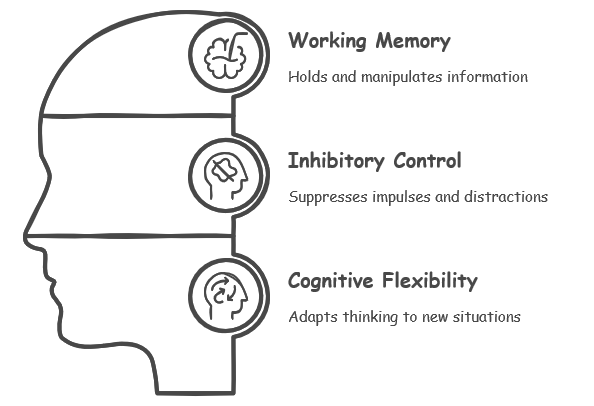
-
Working Memory: Imagine this as your brain's "mental scratchpad." Working memory allows you to hold and manipulate several pieces of transient information simultaneously. It's the cognitive process that enables you to remember a phone number long enough to dial it or to retain key pieces of data during a meeting or lecture, facilitating complex thought processes.Image of Working Memory in the Brain
- Inhibitory Control (Self-Control):: This is your brain's "brake system," providing the ability to suppress impulsive responses and resist distractions that could derail ongoing tasks or goals. Inhibitory control is what helps you stay focused during a long meeting, resist the temptation to check your phone while driving, or maintain composure during an emotionally charged conversation.Image of Inhibitory Control in the Brain
- Cognitive Flexibility (Mental Flexibility):: This function acts like your mind's "GPS recalculator," enabling you to adapt your thinking to unexpected situations, shift between tasks, and view issues from multiple perspectives. Cognitive flexibility is crucial when solving problems that have no clear solution, adapting to sudden changes in plans, or understanding a debate from both sides.
Now, let's delve into the additional crucial executive functions that complement the core trio. These skills are instrumental in refining our ability to organize, strategize, and execute plans effectively. They enhance our cognitive toolkit, allowing us to manage daily tasks and long-term challenges with precision and foresight. Each of these functions contributes uniquely to our overall cognitive efficiency and success in both personal and professional realms.
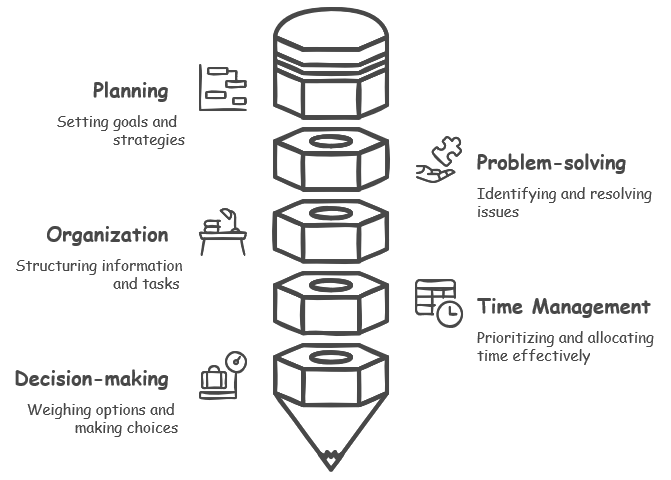
-
Planning: This involves setting short-term or long-term goals and determining the most effective strategies for achieving them. Effective planning requires the foresight to predict outcomes, the resilience to adjust plans as needed, and the persistence to follow through.
-
Problem-solving: Here, you're called to identify the root of a problem, generate possible solutions, evaluate these solutions, and then implement the most effective one. This is crucial for navigating daily challenges at work, in school, and in personal life.
-
Organization: This skill helps in arranging or structuring information or tasks, making it easier to access and process them. Good organization reduces clutter, both mentally and physically, facilitating smoother execution of tasks.
-
Time Management: Effective time management involves prioritizing activities and allocating time where it's most needed, ensuring that you meet deadlines and achieve work-life balance.
-
Decision-making: This function involves weighing the pros and cons of different options to make a choice. Good decision-making requires accurate knowledge, the ability to anticipate outcomes, and the confidence to make tough choices.
Executive functions are indispensable tools that permeate every facet of our lives, playing a pivotal role in how we interact with the world and realize our ambitions. These advanced cognitive skills are not just about managing tasks; they are central to our ability to function and excel in a rapidly changing environment. Here's a detailed exploration of why these functions are so crucial:
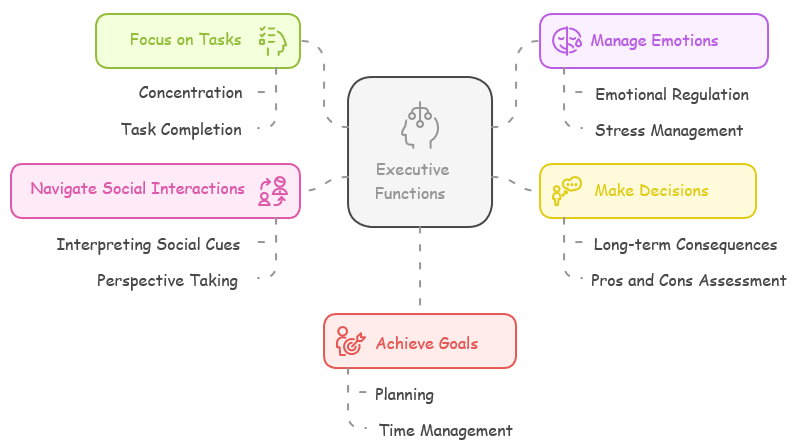
-
Focus on Tasks and See Them Through to Completion: Executive functions enable us to concentrate on specific activities without succumbing to distractions. This focus is critical in today’s fast-paced world, where the ability to maintain attention on a task until completion—whether it's a complex work assignment, a long-term educational goal, or a personal project—is essential for success and satisfaction. This sustained attention helps in achieving a high level of detail
and quality in work and studies.
-
Example : Imagine you're working on a big project at work or prepping for a significant exam. Executive functions help you tune out distractions—like the ping of a new email or the buzz of your phone—and stick with the task until it's done. This focus is what helps you finish a marathon of study sessions or nail a project deadline, ensuring you're not just starting things but actually finishing them with finesse.
-
Manage Emotions and Cope with Stress: These functions help regulate our emotional responses, allowing us to experience feelings without being overwhelmed by them. This regulation is key in stressful situations where maintaining composure can affect outcomes in both personal crises and professional high-stakes negotiations. Effective emotional management leads to resilience, enabling individuals to recover from setbacks and persist towards their goals despite adversities.
-
Example : Ever found yourself in a heated argument or facing an unexpected bill? Your executive functions help you keep your cool, allowing you to handle stress without losing your temper or falling apart. This emotional regulation can be the difference between a constructive discussion and a relationship-damaging blowout, or between solving a problem calmly and panicking.
-
Make Informed, Thoughtful Decisions: By allowing us to consider the long-term consequences of our actions, weigh the pros and cons, and assess different strategies, executive functions foster enhanced decision-making. This capability is indispensable in everything from daily choices like financial planning to life-changing decisions such as career moves or personal investments. Thoughtful decision-making also minimizes potential negative consequences from impulsive actions.
-
Example : When faced with decisions, like choosing a new car or deciding where to invest your savings, executive functions help you weigh your options carefully. You can consider the long-term impacts of each choice, rather than making a snap decision based on immediate desires. This careful deliberation helps ensure you’re making moves that align with your broader life goals.
-
Navigate Social Interactions and Maintain Relationships: These functions are vital for interpreting social cues, taking another person’s perspective, and responding appropriately. They allow for effective communication and understanding, which are foundational for building and sustaining both personal and professional relationships. The ability to navigate complex social landscapes can determine success in collaborative environments and in building supportive networks.
-
Example : From reading a friend's non-verbal cues during a tough time to knowing the right thing to say at a job interview, executive functions help you manage social interactions. They're key for empathy, understanding different perspectives, and maintaining strong relationships—whether you're networking for career opportunities or supporting a partner through a rough patch.
-
Achieve Personal and Professional Goals: Executive functions equip us with the foresight to set realistic goals and the discipline to follow through with them. They enable the planning, organization, and time management skills necessary to progress towards these goals systematically. Whether it’s pursuing a promotion, improving health, or learning a new skill, executive functions lay the groundwork for achieving these objectives by facilitating structured approaches and
adaptive adjustments when faced with obstacles.
-
Example : Whether you're aiming to get fit, climb the career ladder, or learn a new language, executive functions set the stage for success. They help you plan your approach, organize your schedule, and stick to it, even when obstacles arise. For instance, your goal to run a 5K race might involve a training schedule that your executive functions help you stick to, adjusting as needed if you encounter setbacks like bad weather or a busy week.
When executive functions aren't working as they should, daily life can feel a lot more challenging. Whether it's keeping track of a simple schedule or making decisions, these dysfunctions can really throw a wrench in the works. Let’s take a closer look at some common issues and what they might look like in everyday situations.
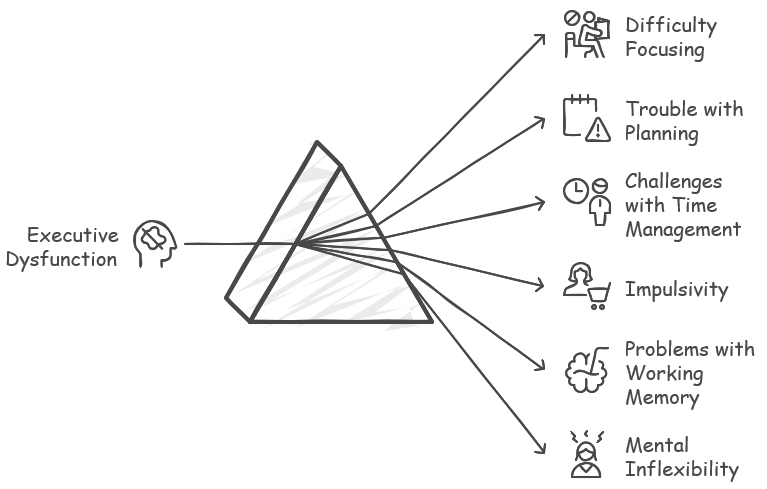
-
Difficulty focusing and paying attention: This can mean being easily distracted, having trouble staying on task, or daydreaming frequently.
-
Example : Ever find yourself reading the same line over and over again because you just can't seem to concentrate? Or maybe during meetings, you drift off, missing crucial points. This aspect of executive dysfunction is like trying to listen to a radio station that keeps losing signal. You want to stay tuned, but somehow you just can’t maintain the connection.
-
Trouble with planning and organization: Individuals may struggle to set goals, break down tasks, or keep track of materials and deadlines.
- Example : Imagine deciding to clean out your garage, but you end up just moving things from one pile to another without making any real progress. Or you might have a big project due, but you can't figure out where to start, so you end up in a last-minute panic. This is what planning and organization difficulties look like—having a goal but struggling to lay out the steps to get there.
-
Challenges with time management: Estimating how long things take, prioritizing tasks, and meeting deadlines can be difficult.
- Example : This might show up as consistently underestimating how long it will take to get through your to-do list, which can lead to being late or missing deadlines. It’s like planning to bake a cake an hour before guests arrive, not realizing that you need more time.
-
Impulsivity: This might look like acting without thinking things through, blurting out answers or comments, and difficulty keeping emotions in check.
- Example : Impulsivity could be responding to an email too quickly without fully thinking through the consequences, or it might look like shopping sprees that feel impossible to control. This type of behavior is often regrettable and feels as if you're acting without a filter between your thoughts and your actions.
-
Problems with working memory: Holding onto information long enough to use it – like following instructions or remembering details – can be a challenge.
- Example : Have you ever gone to the grocery store and realized you can’t remember half of what you needed? Or maybe you're in the middle of a task at work when someone interrupts you, and then you completely lose track of what you were doing. When working memory isn’t up to speed, keeping track of the details becomes a hurdle.
-
Mental inflexibility: Trouble shifting from one task to another, adapting to unexpected changes, or seeing alternative perspectives. This could manifest as struggling when your daily routine gets thrown off or being unable to view a problem from a different angle, which can stall solutions. It’s like having a mental roadblock that prevents you from navigating around the unexpected or thinking outside the box.
- Example : For instance, if a person has a set morning routine—wake up, have coffee, then read the newspaper—any disruption, such as the coffee machine breaking or the newspaper not being delivered, can throw off their entire morning. They might struggle to find an alternative or adjust their routine, leading to frustration and a sense that the day has started on the wrong foot. This kind of inflexibility highlights how dependent someone can be on their established habits and how challenging
even minor changes can be.
Executive functions, managed primarily by the prefrontal cortex of the brain, are among the most energy-intensive cognitive processes. The brain overall is a high-energy organ, consuming an estimated 20% of the body's energy, despite making up only about 2% of its weight. The prefrontal cortex, where executive functions like decision-making, problem-solving, and impulse control are concentrated, is particularly demanding in terms of energy use.
Why Energy Demands of Executive Functions is so high ?
Executive functions, primarily orchestrated within the prefrontal cortex, are some of the most energy-intensive processes within the human brain. This high demand stems from the complexity and continuous activity required for tasks such as planning, focusing, multitasking, and managing disruptions.
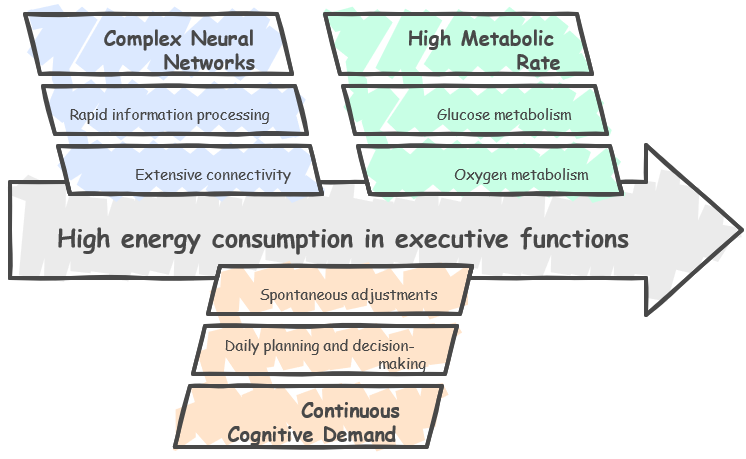
-
Complex Neural Networks: The prefrontal cortex is a hub of connectivity, with extensive neural networks linking it to various other brain regions. These networks facilitate the rapid integration and processing of information necessary for decision-making and problem-solving. Maintaining and operating these intricate networks requires a substantial amount of metabolic energy.
-
Continuous Cognitive Demand: Executive functions are constantly called upon throughout the day, from the moment you plan your morning routine to decision-making at work, and adjusting plans spontaneously. Each switch, decision, and plan requires a burst of cognitive effort that cumulatively consumes significant energy.
-
High Metabolic Rate: Research using techniques like positron emission tomography (PET) and functional magnetic resonance imaging (fMRI) shows that areas of the brain linked to executive function display high levels of glucose and oxygen metabolism, indicative of their intense energy use. These studies confirm that the brain regions involved in executive tasks are some of the most metabolically active.
Why It Matters ?
Understanding the high energy demands of executive functions is crucial for several reasons: In short, the importance of understanding on high energy demand by executive function is to understand the underlying reason for it and cope well with it.
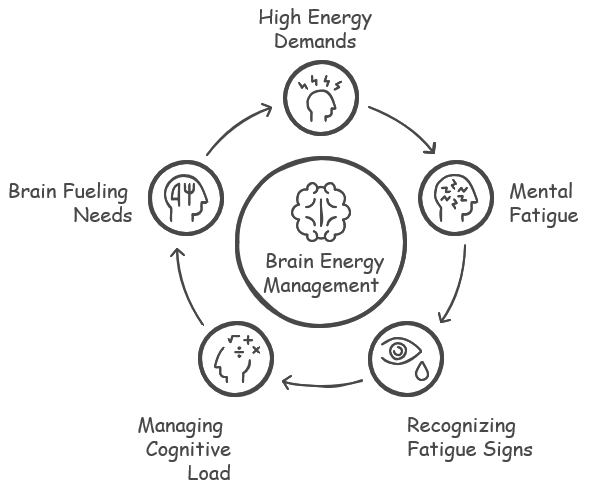
-
Understanding the Cause of Mental Fatigue: Just as intense physical activity can deplete the muscles of energy, prolonged mental activity strains the brain. Executive functions, due to their high energy requirements, can lead to mental fatigue when overexerted. This fatigue manifests as reduced concentration, slower thinking, and poorer decision-making. Recognizing the signs of mental fatigue is key to managing cognitive load and maintaining productivity.
-
Understanding Limitations: The finite energy resource of the brain means that the efficiency of executive functions can diminish throughout the day, especially if not managed well. This is particularly important in work and learning environments. It underscores the necessity of taking breaks, pacing oneself, and employing effective strategies like prioritization and delegation to manage cognitive demands.
-
Understanding the Need of Fueling the Brain: Adequate nutrition, sleep, and physical activity are essential for replenishing brain energy. Diets rich in omega-3 fatty acids, antioxidants, and moderate amounts of complex carbohydrates can enhance cognitive function by providing the brain with the necessary nutrients. Furthermore, sleep is crucial for the removal of brain waste products and recovery from cognitive load, while regular physical exercise boosts blood circulation to the brain, enhancing
oxygen and nutrient supply.
Reference
YouTube
|
|






